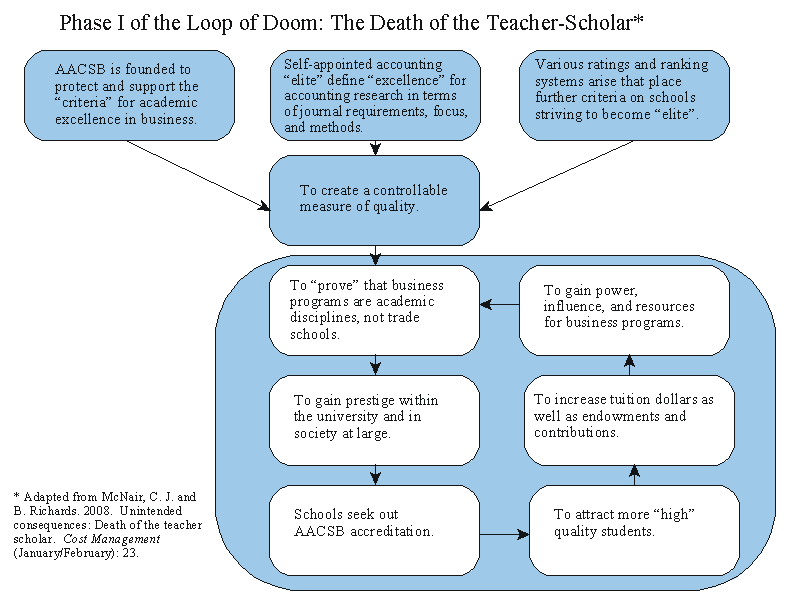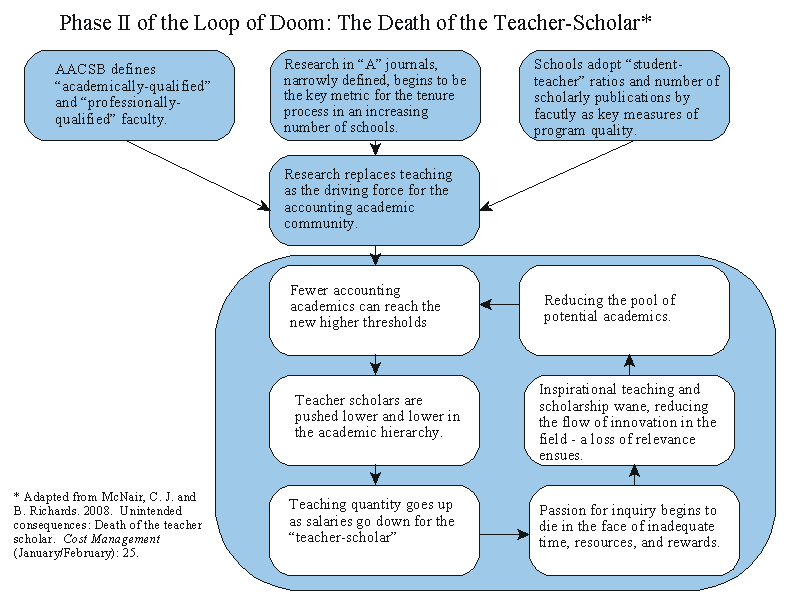
Summary by James R. Martin, Ph.D., CMA
Professor Emeritus, University of South Florida
Controversial Issues Main Page |
Education Issues Main Page
Although there are many reasons given for the shortage of Ph.D.s in accounting education (e.g., baby boomers are retiring, many under-funded Ph.D. programs are closing, there is more money to be made in private industry, etc.), the purpose of this article is to argue that the root cause of the shortage of "qualified" accounting educators (Ph.D.s) is the death of the teacher-scholar.
What is a Teacher-Scholar?
McNair and Richards define the teacher-scholar as "an individual who is as dedicated to teaching as to pursuing new ideas and engaging in scholarly discourse." ..."someone who experiences real joy in discovering newness among the "mundane" doings of accounting." ..."not defined by the number of articles published in "A" level journals, end-of-term class evaluations by students, or the results of assessment exams that "test" student knowledge of a narrowly defined, and often dated, body of knowledge." However, these narrowly defined accomplishments are what accounting academe appears to reward.
What happened?
The following illustration (Phase I of the Loop of Doom) provides the basis of the logic underlying the McNair/Richards argument. It begins with the various attempts to protect, support and define academic excellence in accounting education. All three forces of change (i.e., the founding of the AACSB, the self-appointed accounting elite, and the various rating and ranking systems) are viewed as important, but the authors argue that "the concept of an A-journal is insidious" (p. 25).

The second illustration shows what the three forces of change have created. Research in A-journals (as defined by the accounting elite) has replaced teaching as the driving force underlying academic excellence. Since few can publish in these so called A-journals, fewer accounting faculty make tenure at the growing number of schools that require two or three articles at this level. So these people (many teacher-scholars) move lower to schools that require more teaching and less academically defined "scholarly research". Their salaries decrease along with their interest in teaching and relevant inquiry, ultimately decreasing the pool of accounting academics. Older faculty, who were tenured in earlier days, either retire, or stay on with inverted salaries and higher teaching loads to offset the lower teaching loads of the faculty elite. This in turn reduces their interest in inspirational teaching and scholarly activity. Phase II of the Loop of Doom illustrates this sequence of events.

Conclusion
McNair and Richards end by noting that the death of the teacher-scholar may in turn cause the death of accounting academe. They do not provide any recommendations for correcting this broken system, but mention Pareto's The Rise and Fall of the Elites. The implication appears to be that the problem will eventually solve itself.
__________________________________________
Note
There is more to this paper than I could include in this brief summary, so I highly recommend it to those who are interested in the future of higher education. The full text of the paper is available from ProQuest.
Related summaries:
AACSB International. 2012-2013, 2015-2016, 2016-2017, and 2017-2018 Salary Survey Reports: Executive Summary. AACSB. (Note).
Bennis, W. G. and J. O'Toole. 2005. How business schools lost their way: Too focused on "scientific" research, business schools are hiring professors with limited real-world experience and graduating students who are ill equipped to wrangle with complex, unquantifiable issues - in other words, the stuff of management.". Harvard Business Review (May): 96-104. (Summary).
Grasso, L. 2008. The accounting Ph.D. shortage: Crisis or opportunity? Cost Management (March/April): 15-25. (Note).
Hopwood, A. G. 2008. Management accounting research in a changing world. Journal of Management Accounting Research (20): 3-13. (Summary).
Kachelmeier, S. J., S. Madeo, D. Plumlee, J. H. Pratt, G. Krull and G. Thornton. 2005. Report of the AAA/AAPLG Ad Hoc Committee to assess the Supply and Demand for Accounting Ph.D.s. A joint project of the American Accounting Association and the Accounting Programs Leadership Group. (Note).
Leslie, D. W. 2008. Accounting Faculty in U.S. Colleges and Universities: Status and Trends, 1993-2004. A Report of the American Accounting Association. American Accounting Association. (Note).
Martin, J. R. Not dated. AACSB International Salary Survey Reports: Executive Summary. AACSB. Management And Accounting Web. (AACSB Salary Reports).
Martin, J. R. Not dated. Notes to those considering an Accounting Ph.D. Management And Accounting Web. NotesforAccountingPhDStudents.htm
Martin, J. R. Not dated. The accounting doctoral shortage and opportunities to teach accounting. Management And Accounting Web. AccountingDoctoralShortage.htm
Zeff, S. A. 2018. A critical view of the evolution of the accounting professoriate. abstract_id=3257438